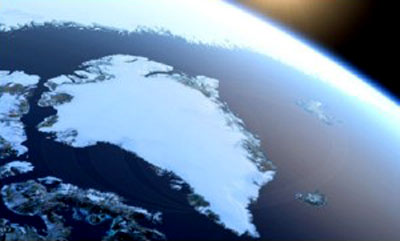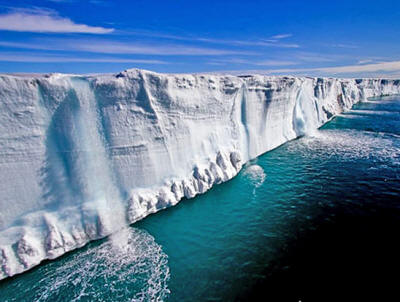|

by Ecological Internet
July 25, 2012
from
ClimateArk Website

Global Warning
With Sudden Greenland
Ice Melt, Reiterating Declaration of Planetary
Ecological Emergency.
Given dramatic Greenland
ice sheet melt and historic U.S. drought’s threat to
global food supply, Ecological Internet renews calls
for urgent measures to avoid global ecosystem
collapse, achieve sustainable development, and
sustain global ecosystems and the biosphere
Madison, WI
Nearly the entire massive ice sheet that
blankets Greenland suddenly started melting this month, even its
coldest places.
In just a few days, the amount of thawed
ice sheet surface skyrocketed from 40 percent to 97 percent. This
continues the shocking heating and melting of the Arctic, which is
severely impacting the Northern hemisphere’s weather - including
contributing to America’s dramatic drought and heat wave - through
changes in the jet and gulf streams.
According to a NASA press release [1] which includes a stunning
satellite interpretation of the melt - about half of Greenland’s
surface ice sheet naturally melts during an average summer.
But data from three independent
satellites this July showed that in that on July 8, about 40 percent
of the ice sheet had undergone thawing at or near the surface.
In just a few days, the melting
dramatically accelerated and an estimated 97 percent of the ice
sheet surface had thawed by July 12.
Carbon pollution thresholds appear to
have been reached whereby the Greenland ice sheet will begin to
fully melt, raising sea levels by as much as 7 meters.
“We welcome NASA’s ability to
monitor the Arctic, yet statements there is no cause for concern
are just ridiculous. I don’t accept this is a natural cycle; it
is too coincident with Arctic sea ice melt, and what is
happening to the Arctic in general.
When the entire Greenland ice
sheet’s surface melts in a few days, abrupt climate change has
arrived, global ecosystem collapse has markedly intensified, and
the human family clearly faces a global ecological emergency,”
states Ecological Internet’s President and global ecological
sustainability expert, Dr. Glen Barry.
Arctic melting - and continental heat
waves and other instances of extreme weather - are entirely
consistent with decades of scientific predictions regarding
anticipated impacts of climate change.
What is so alarming is the speed and
intensity of the observed abrupt climate change. Sudden accelerated
melting of Greenland ice sheet is a game changer, clearly showing
abrupt climate change has become apocalyptic and exceeds all
expectations.
Ecological Internet is profoundly concerned with self-evident
impacts of this human-caused ecological collapse upon food, water,
and other aspects of human and all life’s habitat.
On the basis of this sudden major Greenland ice melt - and other
evidence of abrupt climate change globally emerging daily, including
America’s drought - Ecological Internet reiterates our declaration
of a planetary ecological emergency.
We call for all defensive ecological
policy measures to be taken - by willing governments and through
global people power - commensurate with the degree of threat posed
to continued human well-being, and even our existence, by collapsing
ecosystems.
“We ignore such evidence of
potentially apocalyptic abrupt climate change and global
ecological collapse at our peril.
The Greenland ice sheet melting in a
few days is shocking evidence of a global ecological emergency,
and clearly highlights the urgency of immediately reducing
greenhouse gas emissions, destruction of intact ecosystems, and
growth in economies, consumption and population.
The age of destroying ecosystems for
resources must end, as we embrace ecological protection and
restoration as society’s central organizing principles.”
declares Dr. Barry.
MORE
Ecological Internet’s first declaration [2] was based upon scientific
findings in “Planetary
Boundaries - Exploring The Safe Operating Space for Humanity,”
published in 2009 in the journal Ecology and Society.[3]
Humanity was found to have already
overstepped three of nine planetary boundaries - biodiversity loss,
climate change and the nitrogen cycle - and to be approaching
boundaries for the use of fresh water and land, and ocean
acidification.
Earlier this year, the warning was renewed in support of leading
international Earth scientists’ findings that we face a perfect
storm of ecological and social problems driven by overpopulation,
over-consumption and environmentally damaging technologies.
In a
paper prepared for the Rio+ 20 Earth Summit
to be held in Rio de Janeiro in June, they also noted the failures
of the economic,
“perpetual growth myth” and called
for “dramatic action to avert a collapse of civilization”.[4]
NOTE
Dr.
Barry is an internationally
recognized expert on rainforest, climate change, and environmental
sustainability issues.
Ecological Internet has built a massive
global following on these matters over the past 13 years, since
being established with a grant from the MacArthur Foundation.
Dr. Barry was recently named a global
visionary by the Utne Reader. He welcomes the opportunity to be
interviewed.
Endnotes
[1]
Satellites See Unprecedented Greenland Ice
Sheet Surface Melt
[2] Declaration of global ecological emergency first made by
Ecological Internet on April 13, 2010,
Planetary Ecological Emergency Declared
[3] Journal Article: Planetary
Boundaries - Exploring The Safe Operating Space for Humanity
[4]
Environment and Development Challenges:
The Imperative to Act
Satellites
Pick Up...
Unprecedented Greenland Ice Melt
July 26, 2012
from
BWorldOnline Website

The Greenland ice
sheet
Greenland’s surface ice cover melted
this month over a larger area than ever detected in more than 30
years of satellite observations, NASA said Tuesday.
According to measurements from three separate satellites analyzed by
NASA and university scientists, an estimated 97 percent of the ice
sheet surface thawed at some point in mid July, the agency said in a
statement.
“This was so extraordinary that at
first I questioned the result: was this real or was it due to
data error?,” said NASA’s Son Nghiem.
The expert recalled noticing that most
of Greenland appeared to have undergone surface melting on July 12
while analyzing data from the Indian Space Research Organisation’s
Oceansat-2 satellite.
Results from other satellites confirmed the findings. Melt maps
drawn up showed that on July 8 about 40 percent of the ice sheet’s
surface had melted, rising to 97 percent four days later.
The news comes just days after NASA satellite imagery showed that a
massive iceberg
twice the size of Manhattan had broken off a glacier
in Greenland.
“This event, combined with other
natural but uncommon phenomena, such as the large calving event
last week on Petermann Glacier, are part of a complex story,”
said Tom Wagner, NASA’s cryosphere program manager.
In the summer, on average about half of
the surface of Greenland’s ice sheet melts naturally, NASA said.
Normally, most of that melt water
quickly refreezes at high elevations, while in coastal regions some
of it is retained by the ice sheet while the rest flows into the
ocean.
“But this year the extent of the ice
melting at or near the surface jumped dramatically,” NASA added.
Researchers have yet to determine
whether the melt, which coincided with an unusually strong ridge of
warm air over Greenland, will contribute to a rise in sea level.
NASA said that even the area near the highest point of the ice
sheet, located 2 miles above sea level, showed signs of melting.
According to glaciologist Lora Koenig, who was part of the team
analyzing the data, melting incidents of this type occur every 150
years on average.
“With the last one happening in
1889, this event is right on time,” Koenig said. “But if we
continue to observe melting events like this in upcoming years,
it will be worrisome.”
|


